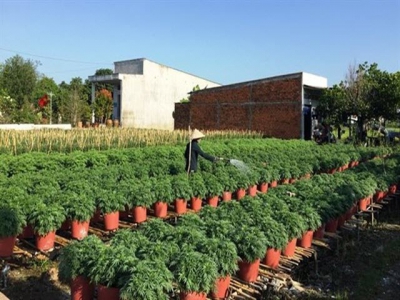Mekong Delta takes steps to improve farming cooperatives

Ho Chi Minh City - Farmers' incomes in the Mekong Delta have risen as a result of membership in agricultural cooperatives, but the effectiveness of the groups is still limited, experts have said.
Flowers and ornamental plants are cultivated by members of the Pho Tho Flower and Ornamental Plant Cooperative in Can Tho city (Photo: VNA)
Dong Thap province, for example, has good linkages between cooperatives and companies. Set up in 2013, My Dong 2 Agricultural Service Cooperative has more than 100 members and has contracted with the Southern Seed Corporation in Ho Chi Minh City to farm rice for 16 consecutive rice crops.
Ngo Phuoc Dung, director of My Dong 2, said the cooperative’s members are guaranteed outlets and have stable profits higher than rice farmers without farm contracts.
The Mekong Delta, the country’s largest rice, seafood and fruit producer, has more than 1,800 agricultural cooperatives, accounting for one-third of the total in the country. They have more than 230,000 members, or 15 percent of the delta’s farming households.
The delta also has more than 11,700 cooperative groups with more than 260,000 members.
All of the cooperatives have helped the agricultural sector meet market requirements for large quantity and standard quality. Members, for example, have received instruction in advanced farming techniques to deal with climate change, including production of high-quality seeds and disease management, according to the Ministry of Agriculture and Rural Development’s Department of Cooperative Economics and Rural Development.
Though the delta’s cooperatives have links with companies under value chains, there is still a lack of investment capital and information about market outlets, according to experts.
Le Duc Thinh, Director of the Department of Cooperative Economics and Rural Development, said that poor management had stifled operational effectiveness of cooperatives.
Most directors of cooperatives are farmers or agricultural engineers who do not have knowledge and skills in management, trade and markets, he said. The cooperatives are also small scale and find it difficult to access loans.
Nguyen Phuoc Thien, Deputy Director of Dong Thap province’s Department of Agriculture and Rural Development, said that lack of market information and incomplete legal regulations for farm contracts had hindered linkages between cooperatives and companies.
About 40 percent of rice contracts between farmers and companies in the delta are successfully implemented, a higher rate than other agricultural products, according to the Department of Cooperative Economics and Rural Development.
To improve profits, the Department of Cooperative Economics and Rural Development has ensured that farmers will have access to soft loans and receive advanced techniques and effective farming models such as intercropping of shrimp or fish, or rotation of crops in rice fields.
The agency will also be responsible for improving the skills of cooperative managers.
Other measures include working with international organisations to help farmers and cooperatives cope with climate change in the delta.
Ca Mau province plans to establish 20 new cooperatives, 100 cooperative groups and two to three cooperative unions each year from now until 2030.
Do Van So, Chairman of the Ca Mau Cooperative Alliance, said the province would focus on training human resources and instructing legal regulations for developing cooperatives. It will also create favourable conditions for cooperatives to access support policies on advanced techniques, building brand names, and trade promotions.
In Hau Giang province, the provincial People’s Committee has ordered relevant departments and agencies to provide financial support for cooperatives to invest in infrastructure. The province has 21 agricultural cooperatives that meet conditions to receive support for developing infrastructure with a total cost of 25 billion VND (1.07 million USD), according to its Department of Agriculture and Rural Development.
Có thể bạn quan tâm
 Vietnam struggles to reach rice export plan
Vietnam struggles to reach rice export plan Analysts warn that Vietnam will have to struggle to implement the rice export plan this year because many key markets have tightened control over imports.
 Japanese firms increase investment in Vietnam’s agriculture
Japanese firms increase investment in Vietnam’s agriculture Up to 70 percent of Japanese businesses want to expand investment in Vietnam, especially in agriculture
 Agriculture businesses forge connection to join global value chains
Agriculture businesses forge connection to join global value chains Agriculture businesses should embrace connection in order to participate in global value chains, heard a forum held in Hanoi on October 8.